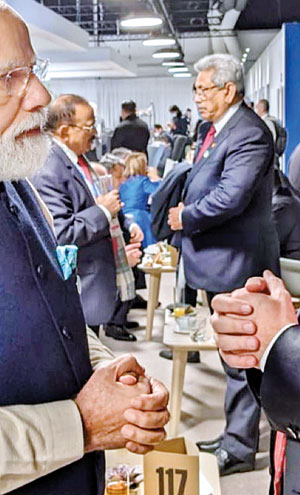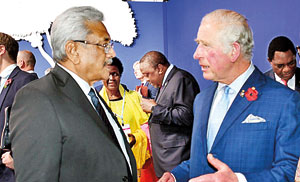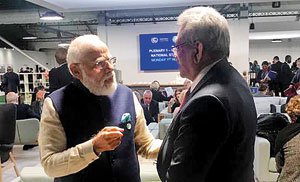Columns
Another picture at COP26: President’s powwow with India’s National Security Advisor
View(s):
The pic that created a buzz: President Gotabaya with Ajit Doval
President Gotabaya Rajapaksa who was in Glasgow, Scotland to attend the 26th UN Climate Change Conference of the Parties (COP26) brushed shoulders with many prominent world leaders including Indian Prime Minister Narendra Modi, a photo of which was tweeted by the Indian leader and the Sri Lankan President.
Shortly afterward, the Indian PM tweeted a photograph of him catching up with Austrian Chancellor Alexander Schallenberg but what caught the attention of many in Sri Lanka was what was happening in the background. It showed President Rajapaksa in conversation with India’s National Security Advisor (NSA) Ajit Doval which led to speculation on social media as to what the discussion was about. The President and Doval are known to be close acquaintances and the latter has visited Sri Lanka twice since President Rajapaksa took office, once in January 2020 and again in November the same year.
Among others President Rajapaksa met on the sidelines of COP-26 was with Britain’s Prince Charles at a reception arranged by the Commonwealth Secretariat. The future king of the United Kingdom is expected to be the titular head of the 54-member Commonwealth grouping after Queen Elizabeth, but the position is not yet confirmed. Whether or not the Prince was discreetly canvassing for the job, his long time passion for the environment was not in doubt. He made an impassioned speech at the conference on behalf of the future generation.

President Gotabaya with Prince Charles

President Gotabaya with Narendra Modi
No mention of SL project in New Fortress quarterly report
The US-based New Fortress Energy Inc on Wednesday released its third quarter results for the period ending September 30, 2021.
However the report of the company did not contain any reference to the controversial deal for the purchase of 40 percent Sri Lankan Government shares in the Yugadanawi power plant, though it speaks of other developments.
In its development update, the company referred to projects in Nicaragua, Mexico, Barcarena and Santa Catarina but failed to mention its announced investment in Sri Lanka’s West Coast Power Ltd (WCP). However, the company website contains a September 21 statement on the proposed
Sri Lanka investment and engagement while the
Sri Lanka Government is yet to make a public pronouncement on the project.
 Local fisher leaders pour out grievances on Indian HC
Local fisher leaders pour out grievances on Indian HC
A group of Northern fishermen representatives met Indian High Commissioner Gopal Baglay on Monday evening to brief him about the difficulties they faced due to the Indian bottom trawlers in the Northern sea.
The fishermen pointed out that their livelihood was under threat due to Indian fishermen’s entry into Sri Lankan waters for illegal bottom trawling activities which have damaged fishing nets and other equipment belonging to local fishermen.
The meeting went on for nearly two hours with the High Commissioner patiently listening to their grievances. Local fishermen made it clear that Indian fishermen should stop their trespass into Lankan waters. With the Fisheries Ministry failing to provide any compensation for the damages caused to their fishing gear, the local fisher leaders requested that India should consider compensating them for the damages caused.
The meeting came after a series of protests staged by local fishermen groups in the North against Indian fishermen’s bottom trawling, a method that is banned in the country and worldwide as it was an impediment to sustainable fishing.
The High Commissioner assured to convey their concerns to New Delhi and the Tamil Nadu State government while stressing that India, too, has taken steps to introduce alternative fishing methods such as multiday fishing to discourage Tamil Nadu fishers crossing into territorial waters of other countries. Last week, the matter was raised at a meeting between the Indian High Commissioner and Tamil National Alliance (TNA) leader R. Sampanthan. TNA spokesperson M.A. Sumanthiran also took part in the meeting and a followup meeting with Northern fisher leaders in Colombo. After the meeting concluded in the evening, the Jaffna MP hosted an early dinner for the Northern fishermen representatives at his residence in Wellawatte before they set out on their return journey back home.
Lanka becoming playground for big power geopolitical games
By looking at the statements of some powerful countries, one wonders whether Sri Lanka is becoming the playground of the superpowers as geopolitical developments are escalating in recent times.
Criticising the recent grouping of the United States, Britain and Australia to establish AUKUS, a trilateral security pact which will provide Australia with at least eight nuclear-powered submarines, Chinese Ambassador Qi Zhenhong said this development is like holding up a “Sword of Damocles” on the heads of countries in the Pacific-Indian Ocean, according to a statement issued by the embassy in Colombo early this week .
Not only that, he was specific on Sri Lanka too: “Sri Lanka is located at the centre of the Indian Ocean. No matter it’s nuclear submarines frequently entering the Indian Ocean, the nuclear arms race escalating, or some hegemonies ganging up in clique and forcing small and medium-sized countries to take sides, it will inevitably bring huge security risks to Sri Lanka.” Days later, the Pentagon, the headquarters of the United States Department of Defense, released a comprehensive report on China expressing concerns Sri Lanka is among the countries China considered to setup People’s Liberation Army (PLA) bases or military logistics facilities.
China is pursuing additional military facilities to support naval, air, ground, cyber, and space power projection and Sri Lanka is among a number of countries it is considering as locations for its military bases or logistic facilities, says the Pentagon annual report submitted to the US Congress this week.
The report on the Military and Security Developments Involving China states that along with Sri Lanka, the other countries considered for military facilities include Cambodia, Myanmar, Thailand, Singapore, Indonesia, Pakistan, the United Arab Emirates, Kenya, Seychelles, Tanzania, Angola, and Tajikistan. The report said China is seeking to establish a more robust overseas logistics and basing infrastructure to allow the PLA to project and sustain military power at greater distances.
Since 2008, PLAN ships have visited the Middle East, Europe, Africa, South Asia, Southeast Asia, Oceania, and Latin America and also conducted submarine deployments to the Indian Ocean, demonstrating its increasing familiarity with operating in that region and underscoring the PRC’s interest in protecting sea lines of communication (SLOCs) beyond the South China Sea. The Report added that the Chinese Air Force delivered COVID-19 related medical supplies to countries throughout the region in May 2020. the list includes
Sri Lanka. The Pentagon annual report provides a baseline assessment of the US Defence Department’s pacing challenge and this year’s annual report continues to chart the maturation of the People’s Liberation Army (PLA) and China’s evolving national power as it transitions to a new stage of China’s national strategy.
Last days of the war: Solheim reveals move to take Prabhakaran to Norway
Former Norwegian diplomat and Minister Erik Solheim who had unsuccessfully tried to negotiate a peace deal between the Sri Lankan Government and the LTTE in the early 2000s in a recent interview with an Indian magazine reflected on his days in Sri Lanka and how the war came to an end. Mr. Solheim is now the convenor of the advisory committee of the Belt and Road Initiative International Green Development Coalition (BRIGC) at the World Resources Institute (WRI) in Washington, DC. BRIGC is a non-profit organisation that works with government leaders, business and civil society to promote green initiatives. It is supervised by the Chinese Ministry of Ecology
and Environment and has its own secretariat.
In an interview with India’s The Week, Solheim claimed that he was the only outsider who met the slain LTTE leader, Velupillai Prabhakaran several times before the ceasefire was broken and the final battle played out.
Asked about the LTTE’s final moments and plans to surrender, this is what he said: “They reached out to us, yes. But we do not have any information on Prabhakaran. In the last few months of the war, we communicated with Pulidevan and Nadesan and, through them, with Prabhakaran. We had invited KP (LTTE leader Kumaran Pathmanathan) to Oslo, because he was the LTTE’s foreign policy spokesperson based in Singapore.
KP agreed to come, and he arranged to take [Prabhakaran] from Singapore to Norway. But the meeting was cancelled at the last minute, obviously on Prabhakaran’s orders. So Prabhakaran constantly refused to organise an end to the war, which could have saved many lives.”
Outgoing US envoy highlights differences between US and Chinese investments, but a trade unionist has a question
Outgoing U.S. Ambassador to Sri Lanka Alaina Teplitz last week participated on “The Burn Bag Podcast” episode sharing her perspectives on US-Sri Lanka relations, Sri Lanka’s relationship with China, particularly Chinese aid.
The Ambassador acknowledged that it was ‘very disappointing’ to see the Government’s decision not to be part of the Millennium Challenge Corporation agreement (MCC), given that the Government under former President Mahinda Rajapaksa had sought grants associated with the MCC in the past.
Ms.Teplitz also spoke in detail on the difference between US and Chinese aid, why US aid was not “conditions-based”, and why some Chinese investments did give the US government pause over Sri Lanka’s sovereignty. She also noted that there was no transparency when it came to some of the Chinese deals the government had entered into and expressed concerns on the future consequences to the country.
When the discussion turned towards the recent controversial deal by the US-based New Fortress Energy to invest in Liquefied Natural Gas (LNG) power plant in Kerawalapitiya, the ambassador noted it was purely a commercial deal and it gave a positive signal for further potential investments in Sri Lanka.
The trade unions attached to Ceylon Electricity Board (CEB) are up in arms threatening a full blown strike to protest against the sale of 40 percent stake in the Yugadanawi power plant. During a protest on Wednesday, a trade unionist said, the US tends to lecture a lot on transparency and good governance here but “they should try to apply these things on their companies first before lecturing us.”


Leave a Reply
Post Comment